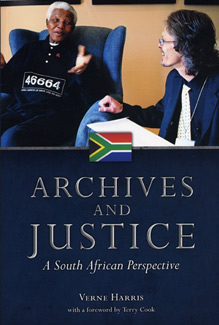
Archives & Justice - A South African Perspective
Bringing South Africa’s archives out into the bright light of democracy is the mission of Mr Verne Harris, head of the Memory Programme at the Nelson Mandela Foundation and author of the recently published Archives and Justice – A South African Perspective.
The book is a collection of 20 essays and 16 newspaper articles written between 1994 and 2005. It reflects his views on the development and use of archives in the new South Africa, above all their transformation into tools for justice.
Mr Harris contends that the archival record cannot be “fixed”; it is fluid – shaped by the process in which it was created (for example, an email versus a hand-written letter) and the way it is interpreted and stored by archivists.
“The meaning and significance of a particular item – a letter or a photo for instance – is located in the layers of context,” says Mr Harris. For instance, questions such as who wrote the letter and under what circumstances, how it relates to other records and why it has been kept become as important as the record itself, if not more so.
“We need to rediscover ourselves as contextualisers in an age where context is more complex and more fluid than ever before,” he writes in the book.
This is one reason why the Nelson Mandela Foundation avoids the custodial route in seeking to document the life and times of Nelson Mandela. “We don’t want to be the guardians of ‘the stuff’,” says Mr Harris. “We don’t care where the stuff is located and who controls it. What we care about is its availability for use.”
For instance, Nelson Mandela’s prison files are currently gathering dust in the National Archives. “They’re locked up like he was locked up,” he remarks.
The prison files are the records the apartheid government kept on Nelson Mandela during his incarceration, and include personal letters he wrote as well as meticulous notes the government made. “They were obsessive record-keepers - as oppressive regimes usually are,” Mr Harris says.
Now the Memory Programme is looking for opportunities and funding to expose these types of archival records to South Africa and the world. “It’s a long road but we’ve taken the first few steps,” says Mr Harris.
Mr Harris’s deconstructive approach was fashioned in the apartheid-era State Archives Service, an experience he describes as akin to being in a straitjacket. “It was very difficult. I was involved in anti-apartheid structures but working in an apartheid structure,” he says.
Drawing from his direct experience of archives being far from an “innocent byproduct, a reflection of reality”, Mr Harris now seeks ways to encourage sub-narratives and even counter-narratives in the work of the Foundation. “It’s about creating space for other voices; allowing other people to come into your space … even voices that we might find scary,” he says.